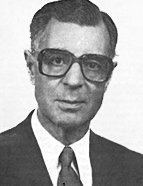

He finished his degree on 29 June 1941 with a dissertation entitled Da letra em branco [ From the blank page ] . His student life already revealed his initial ideology and even traces of his idiosyncrasy. He was a militant Catholic in the Centro Académico de Democracia Cristã [ Academic Centre for Christian Democracy ] (CADC), of which he was president in 1939-1940 and 1940-1941, and a contributor and editor of its journal, Estudos. But he also contributed to the newspaper of the Academia de Coimbra [ Academy of Coimbra ] , Via Latina, sometimes in a controversial manner (“violent and impetuous”, as the monarchist Henrique Barrilaro Ruas said in 1946, in a controversy with Henrique Beirão – see Carta-Aberta de Henrique Barrilaro Ruas a Henrique Beirão, Coimbra, 1946, p. 23), as when, on 30 April 1941, he attacked António Sérgio’s História de Portugal [ History of Portugal ] . But he also considered Marxism (as Barrilaro Ruas sought to defend it) “an attitude as legitimate as any other”, while judging inadmissible the “mystification of facts and ideas” to which it could lead. It thus seems that Silva Dias, even as a young man, already tended towards a critique of an “essayistic history”, where theoretical prejudices arose, far removed from the methodology of document analysis, which he considered to be the foundation of history. He also criticised António José Saraiva’s História da Cultura [ History of Culture ] in conversations with his disciples because of these “flaws”.
He followed Catholic thinking, which led him to publish pages by Jaime Balmes and Ramiro Maeztu, emphasising the importance of Jacques Maritain’s neo-Thomist philosophy, defending political ideas always based on Christian concepts (see, in particular, Estudos Políticos [Political Studies], Coimbra, 1948), writing in the newspaper Novidades, and participating in various Catholic meetings, such as the Marian Congress of Évora in 1946 (16 to 18 October), of which he was one of the rapporteurs. He remained essentially Catholic, although with a shift towards progressive Catholicism, participating, during the Marcelist period, in meetings at the Torre da Marca promoted by the newly arrived bishop of Porto, exiled during the Salazar regime, António Ferreira Gomes, and, for example, writing in the daily newspaper O Jornal (14 March 1980) the article “ Ser cristão e ser de esquerda ” [ Being Christian and being left-wing ] .
This work is financed by national funds through FCT - Foundation for Science and Technology, I.P, in the scope of the projects UIDB/04311/2020 and UIDP/04311/2020.
